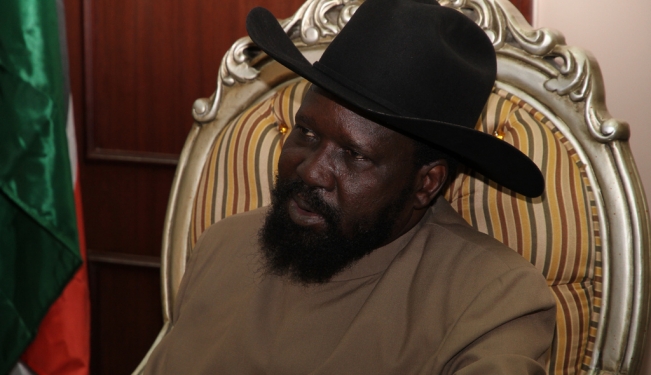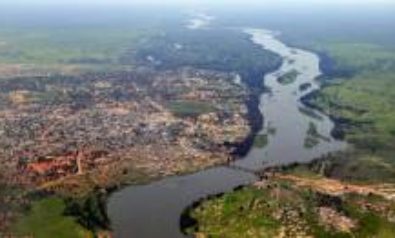Murithi Mutiga and Samuel Ollunga state that though the liberation and formation of Southern Sudan comes at a huge cost, it brings new hope to a war-weary people. The leader Salva Kiir faces enormous challenges in getting the country to its feet.
At the stroke of midnight on July 9, bells will toll aloud across the 10 states of Southern Sudan to herald the birth of the world’s 193rd state. The din from the celebrations will be audible across the globe as Africa’s 54th state takes center stage — for at least one day — before the audience of world nations.
This is a rare moment whose historical significance is hard to overstate. The independence of Southern Sudan will mean the breakup of Africa’s biggest country. It will also stand as the most conclusive seal to bespeak the end of one of the most protracted conflicts in African history. It will denote a select moment where a separatist movement, launched to protest ethnic and religious domination, has succeeded in disentangling itself from the center and formed a completely new state. In a continent where similar rebel groups abound, the feat of the Sudan People’s Liberation Movement (SPLM) is a significant one.
The independence of the South has, of course, come at an alarming cost. Well over two million people lost their lives in the two civil wars that followed the decision by the British to unite the ethnically and religiously diverse North and South at independence in 1956. The first civil war between 1955 and 1972 is responsible for the death of about half a million people, while the second, between 1983 and the signing of the Comprehensive Peace Agreement in 2005, accounted for about 2 million deaths. Millions of people were forced to flee to other parts of Sudan as well as neighboring countries, many of whom were witnesses to, and victims of international crimes. The wars were also accompanied by the twin plagues of famine and disease, which caused a significant number of the casualties.
Yet in Southern Sudan the feeling of hope for the new dawn is ubiquitous. For a people to whom the nightmare of adversity has for so long been commonplace, hope is intermingled with dread as herculean challenges lie ahead.
The SPLM will have to manage the stratospheric expectations of a war-weary population that views independence as a means to solve most, if not all of the problems the nation faces.
These include striking economic inequalities, scanty and debilitated infrastructure, an education system that is in dire need of reconstruction, a pre-modern healthcare system and a political system run by generals who spent the better part of their adult lives fighting the war of independence. The curse of internal ethnic discordance — all-too-familiar in many Africa countries — appears to be another simmering issue that is threatening to test the cohesion of the new country. Coherent and expansive ethnic integration of the new state’s disparate political, social and economic strata will therefore need to be instituted in short order.
Certain key instruments of nationhood are yet to be finalized. Primary amongst them is the much needed pact with the North that defines the border between the two states. Going by history, this might result in a prolonged process fraught with tension and intermittent border conflicts between the North and South. The key driver of a potentially long and drawn-out process will undoubtedly be the oil-rich border regions. Already, the region of Abyei has witnessed an episode of degenerative conflict between the North and South. This was largely symptomatic of the non-implementation of the ruling on the border, delivered last year by the Permanent Court of Arbitration. The conflict has caused tens of thousands of people to flee the region.
The fragility of the Darfur peace process as well as the new flashpoints of Abyei and Southern Kordofan, might have a ripple effect and could serve to rock the boat as Southern Sudan seeks to chart a course towards peaceful Nile waters and prosperous new grounds.
Also important in the grand scheme of foundational national pillars, would be the need for the South to agree on a constitution. Southern Sudan has thus far been functioning under an interim constitution borne out of the Comprehensive Peace Accord process.
Other essential motifs of nationhood that would need to be settled include: an internally acceptable and enduring name; the new state’s currency — currently the Sudanese Pound, with the new regime in the advanced stages of rolling out a South Sudan Pound; citizenship — the new state will need to come up with a definitive blueprint of how to integrate the many people in the North who claim to be from the South, and vice versa, as well as returning refugees and displaced persons from flashpoint areas such as Darfur, Abyei and Southern Kordofan; the new state’s flag and court of arms — the prevailing flag borrows heavily from the Kenyan one; and, its anthem — considering that although one has already been crafted by a collection of poets in an inclusive process, it still remains subject to wider national acceptance and appeal.
Managing these hulking expectations will require significant skill on the part of the SPLM which is led by veteran fighter Salva Kiir. His leadership will be tested to its limits by problems that few world leaders have had to experience. The administration will have to strive for increased ethnic inclusion to deal with the longstanding grouse that the dominant Dinka community has hogged top positions in the SPLM-led government. To manage the sprawling country, with a diverse population and exceedingly poor communication network, devolution of power and resources from the center in Juba will be a wise approach.
The lesson from countries such as neighboring Kenya is that excessive concentration of power in the center breeds resentment borne out of a suspicion of selective appropriation of the national cake, and can lead to instability and violence.
The international community will have to play a role in managing the relationship between the North and the South. The South already accuses the brooding regime in the North of fomenting strife in its territory by financing rebel groups. Dealing with these issues poses a delicate diplomatic challenge for regional countries and players such as the US and China which have interests in both countries.
Yet it would not be right to focus too much on the negatives. South Sudan has many things going for it. It is spectacularly endowed with natural resources including significant untapped gold reserves, the bulk of the oil in the greater Sudan, virgin agricultural lands and an unexploited tourism industry. The administration in Juba, like many of the governments in post-independence Africa in the 1960s, has the political credibility that accrues from a successful liberation effort.
It must take the all-too-apparent lessons from the rest of the continent and use this political capital wisely to avoid many of the problems that stifled other new nations in Africa. It has to steer clear of endemic problems like corruption and ethnic discrimination, and, instead, strive to attain its vast potential.
In the fullness of time, the story of Southern Sudan will unfold for all and sundry to pass judgment. But for now, taking stock of its painful past, Southern Sudan reverberates with a rare but charming spectacle of jubilation, hope, and the fresh start of a new nation.
Support Fair Observer
We rely on your support for our independence, diversity and quality.
For more than 10 years, Fair Observer has been free, fair and independent. No billionaire owns us, no advertisers control us. We are a reader-supported nonprofit. Unlike many other publications, we keep our content free for readers regardless of where they live or whether they can afford to pay. We have no paywalls and no ads.
In the post-truth era of fake news, echo chambers and filter bubbles, we publish a plurality of perspectives from around the world. Anyone can publish with us, but everyone goes through a rigorous editorial process. So, you get fact-checked, well-reasoned content instead of noise.
We publish 2,500+ voices from 90+ countries. We also conduct education and training programs
on subjects ranging from digital media and journalism to writing and critical thinking. This
doesn’t come cheap. Servers, editors, trainers and web developers cost
money.
Please consider supporting us on a regular basis as a recurring donor or a
sustaining member.
Will you support FO’s journalism?
We rely on your support for our independence, diversity and quality.







Comment